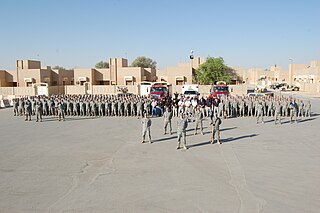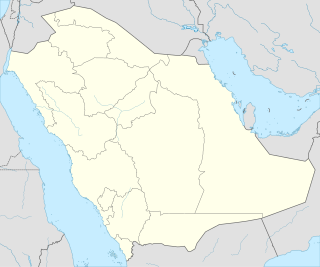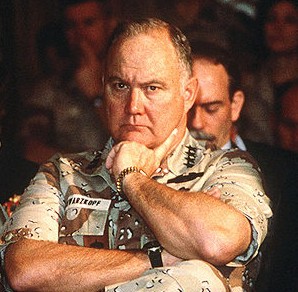Related Research Articles
The Saudi Arabian Armed Forces or SAAF are the military forces of Saudi Arabia. It consists of the Saudi Arabian Land Forces, the Royal Saudi Navy, the Royal Saudi Air Force, the Royal Saudi Air Defense, and the Royal Saudi Strategic Missile Force. The King of Saudi Arabia is the commander-in-chief of the Armed Forces and forms military policy with the Ministry of Defense and the Ministry of Interior. The five Armed Forces are among eight military forces of Saudi Arabia, with the others including the Saudi Arabian National Guard, the Saudi Royal Guard Regiment and Saudi Arabian Border Guards. In addition, there is also the General Intelligence Presidency which is the main intelligence service.

The United Arab Emirates Armed Forces are the armed forces of the United Arab Emirates and have primary responsibility for the defence of all seven emirates. They consist of approximately 60,000 personnel, and are headquartered in Abu Dhabi, United Arab Emirates.

The Gulf War was a war waged by coalition forces from 35 nations led by the United States against Iraq in response to Iraq's invasion and annexation of Kuwait arising from oil pricing and production disputes. It was codenamed Operation Desert Shield for operations leading to the buildup of troops and defense of Saudi Arabia and Operation Desert Storm in its combat phase.

The Khobar Towers bombing was a terrorist attack on part of a housing complex in the city of Khobar, Saudi Arabia, near the national oil company headquarters of Dhahran and nearby King Abdulaziz Air Base on 25 June 1996. At that time, Khobar Towers was being used as living quarters for coalition forces who were assigned to Operation Southern Watch, a no-fly zone operation in southern Iraq, as part of the Iraqi no-fly zones.

King Abdulaziz Air Base, also known as Dhahran Air Base and formerly Dhahran International Airport, Dhahran Airport and Dhahran Airfield, is a Royal Saudi Air Force base located in Dhahran in the Eastern Province, Saudi Arabia. Located west of Thuqbah and 7 km (4 mi) southeast of the Saudi Aramco Dhahran Camp, the airbase was the first Saudi Arabian airport to be constructed, in 1961, and is under the command of Air vice-marshal Prince Turki bin Bandar bin Abdulaziz Al Saud.
The Saudi Arabian National Guard or SANG, also known as the "White Army", is one of the three major branches of the military forces of the Kingdom of Saudi Arabia.

The 123rd Airlift Wing is a unit of the Kentucky Air National Guard, stationed at Louisville International Airport, Kentucky. If activated to federal service, the Wing is gained by the United States Air Force Air Mobility Command.

Prince Sultan Air Base (PSAB) is a military air base located in the closed-city Al Kharj, Saudi Arabia.

Operation Southern Watch was an air-centric military operation conducted by the United States Department of Defense from Summer 1992 to Spring 2003.

The 64th Air Expeditionary Group is a provisional United States Air Force group, most recently assigned to AFNORTH. In that capacity, in support of FEMA operations across the United States, the 64 Air Expeditionary Group (AEG) led Air Force doctors, nurses, medics and general purpose staff augmenting the civilian work force in hospitals along the west coast of California to reduce the patient load on civilian providers battling COVID-19. As the number of United States citizens with COVID-19 declined, the group transitioned to establishing Air Force-led COVID-19 Community Vaccination Center (CVC) sites. Currently there are five sites within the 64th AEG under the command of Title 10 USAF Commander Colonel David Vanderburg.

The 320th Air Expeditionary Wing is a provisional United States Air Force unit assigned to the Air Force District of Washington. It is stationed at Bolling AFB, District of Columbia. The 320 AEW may be activated or inactivated at any time.

Saudi Arabia–United States relations refers to the bilateral relations between the Saudi Arabia and the United States, which began in 1933 when full diplomatic relations were established and became formalized in the 1951 Mutual Defense Assistance Agreement. Despite the differences between the two countries—an ultraconservative Islamic absolute monarchy, and a secular constitutional republic—the two countries have been allies. Former Presidents George W. Bush and Barack Obama have close and strong relations with senior members of the Saudi Royal Family.

The United States Military Training Mission (USMTM) to the Kingdom of Saudi Arabia is a Security Assistance Organization (SAO) which manages and is primarily funded by Foreign Military Sales (FMS) cases between the United States Government and the Kingdom of Saudi Arabia. USMTM was the result of a meeting between King Abdul Aziz and United States President Franklin D. Roosevelt at Great Bitter Lake.

The 165th Airlift Squadron is a unit of the Kentucky Air National Guard 123d Airlift Wing located at Louisville Air National Guard Base, Kentucky. The 165th is equipped with the C-130H Hercules.
The Office of the Program Manager, Saudi Arabian National Guard Modernization Program is a Security Assistance Organization of the United States Army with the primary mission of managing the modernization effort of the Saudi Arabian National Guard (SANG).

The September 11, 2001, attacks in the United States were a terrorist act carried out by 19 hijackers of the Salafist organization al-Qaeda. Motives for the attacks were stated before and after the attacks in several sources. Additionally, Osama bin Laden declared a holy war against the United States, and two fatwā were released by bin Laden and others in 1996 and 1998.

Eskan Village, officially named Eskan Village Compound, is a U.S. military compound located 20 kilometers south-east of Riyadh, Saudi Arabia. The base is home to the Office of the Program Manager - Facilities Security Force (OPM-FSF), Office of the Program Manager Saudi Arabian National Guard Modernization Program (OPM-SANG), the Office of the Program Manager Ministry of Interior-Military Assistance Group (MOI-MAG) and the United States Military Training Mission in Saudi Arabia (USMTM).
Pakistan Armed Forces deployments include all Pakistani military deployments that are stationed outside Pakistan and serving in other countries. The sixth largest military power in terms of active troops, Pakistan has an extensive history of overseas military presence, especially in the Middle East, where it has maintained military contingents, missions and battalions in several states. As part of its foreign policy efforts to expand its military relations and influence in the region, Pakistan signed defence protocols during the 1970s with several Arab countries including Saudi Arabia, Libya, Jordan, Iraq, Oman, the United Arab Emirates and Kuwait, under which members of the armed forces of these countries were imparted professional training by Pakistani advisers and military trainers. Saudi Arabia signed a bilateral agreement with Pakistan on defense cooperation; during that time, there were 50,000 to 60,000 Pakistani military personnel serving abroad with the largest number of these, about 20,000, deployed in Saudi Arabia.

General Order No. 1 was a general order issued by General Norman Schwarzkopf Jr. to United States Central Command in the Middle East during the Gulf War. The order contains provisions restricting the behavior of troops and was intended to show respect to the laws of Saudi Arabia where many US troops were deployed. The order, for the first time in the US Army, prohibited the possession, manufacture, sale or consumption of any alcoholic beverage. It also restricted the possession of "sexually explicit" material, which was broadly defined and led to relatively innocuous documents such as underwear catalogues and bodybuilding magazines being banned. A ban on the taking of war trophies from Iraqi prisoners was later amended to permit US troops to retain captured bayonets as souvenirs. The order influenced those issued in later campaigns, many of which also include bans on alcohol consumption even where US troops are not deployed in Muslim countries.
References
- ↑ "US pulls out of Saudi Arabia". BBC News. 2003-04-29. Retrieved 29 November 2009.
- ↑ Plotz, David (2001) What Does Osama Bin Laden Want?, Slate
- ↑ Bergen, Peter L. (2001). Holy War Inc. Simon & Schuster. p. 3.
- ↑ Opinion Briefing: U.S. Image in Middle East/North Africa, dated January 27, 2009